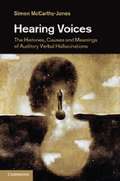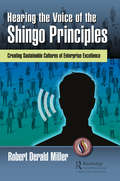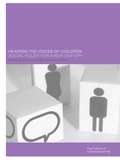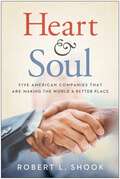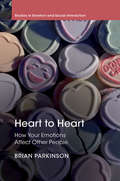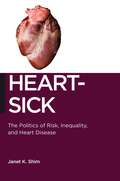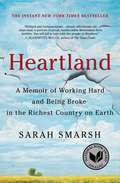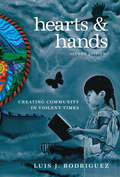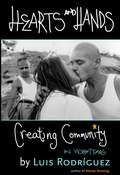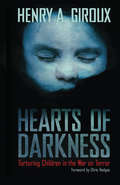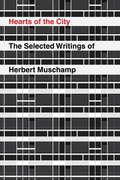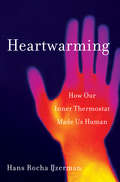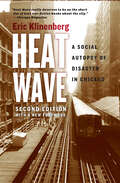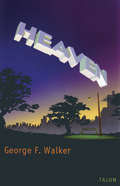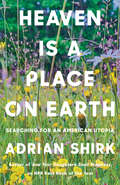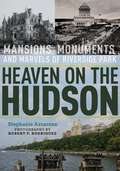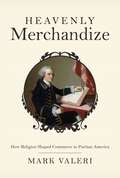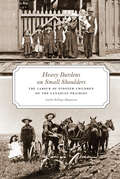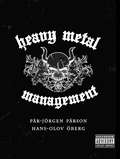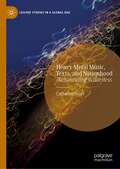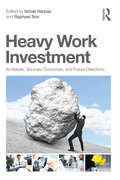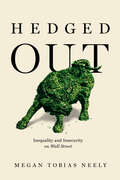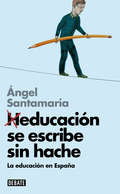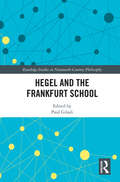- Table View
- List View
Hearing Voices
by Simon Mccarthy-Jones"The meanings and causes of hearing voices that others cannot hear (auditory verbal hallucinations, in psychiatric parlance) have been debated for thousands of years. Voice-hearing has been both revered and condemned, understood as a symptom of disease as well as a source of otherworldly communication. Those hearing voices have been viewed as mystics, potential psychiatric patients or simply just people with unusual experiences, and have been beatified, esteemed or accepted, as well as drugged, burnt or gassed. This book travels from voice-hearing in the ancient world through to contemporary experience, examining how power, politics, gender, medicine and religion have shaped the meaning of hearing voices. Who hears voices today, what these voices are like and their potential impact are comprehensively examined. Cutting edge neuroscience is integrated with current psychological theories to consider what may cause voices and the future of research in voice-hearing is explored"--Provided by publisher.
Hearing the Voice of the Shingo Principles: Creating Sustainable Cultures of Enterprise Excellence
by Robert Derald MillerFor more than 50 years, organizations of all types have struggled to achieve lasting benefits from the many tools and programs associated with various continuous-improvement initiatives. In fact, the notion of "continuous" improvement is largely a misnomer -- for many organizations, continuous improvement has been anything but continuous. Responding to this challenge, Hearing the Voice of the Shingo Principles chronicles key insights that went into development of the Shingo Model for Operational Excellence at Utah State University. While responsible for the Shingo Prize at USU, the author observed that even recipients -- theoretically, the best of the best -- were experiencing this same up-and-down phenomenon. It was as though many of these organizations were reviewed on their very best days but then started declining from that point forward. To build long-term credibility of the Shingo Prize, the author and his team had to understand what was causing such wide variation in results and make certain they were only recognizing those organizations that could demonstrate sustainability of improvements over the long term. They found that sustainability depended less on application of the tools for improvement than on embedding principles deep into the culture of the organization from top to bottom and side to side. This book helps leaders understand their role in building sustainable cultures of enterprise excellence – That is, how to keep the entire enterprise focused on guiding principles that will change beliefs, behaviors, and the overall mindset. In addition, managers will learn how to align systems with principles so that they drive ideal, principle-based behaviors – the goal is for every leader to realign their values with the voice of principles and become an example so that every associate becomes self-motivated to continuously improve every aspect for which they are accountable.
Hearing the Voices of Children: Social Policy for a New Century (Future Of Childhood Ser.)
by Christine Hallett Alan ProutHearing the Voices of Children provides a fresh perspective on social policy. At the heart of the book is the emergence of 'children's voices' and the implications of this for social policy. The authors argue that children's voices should be heard much more strongly in the process of policy formation at all levels. Although there is growing support for this idea, it is not without opposition, and the authors themselves make many critical points about the current attempts to put it into practice.The book is divided into four main themes: hearing children's voices; discourses of childhood; children and services; and resources for children. Childhood experts from the UK, Scandinavia, Germany and Australia, examine how assumptions and models about childhood and discuss ways in which children's voices might become more influential in shaping policy. There are many obstacles to overcome, but the contributors to this volume show that children's participation is possible, and needed, if services are to be improved.This book is essential reading for students and academics in the field of childhood studies, sociology, social policy and education. It will also be of interest to practitioners in the social, child and youth services.
Heart & Soul: Five American Companies That Are Making the World A Better Place
by Robert L. ShookIn Heart & Soul, Shook takes readers on heartwarming journeys through some of America's most successful companies: Mary Kay (Dallas), whose primary focus has always been to be a vehicle for women's success and independence in a world that often supports neither; the company now has more than 2 million women working toward their dreams in 37 countries DaVita (Los Angeles/Denver), dedicated to becoming the world's best dialysis company. America's number-one provider of dialysis treatment, DaVita treats its patients and employees like family members. InRETURN (Cincinnati), a company that intentionally employs those with brain injuries and other neurological challenges World Wide Technology (St.Louis), the largest African-American–owned business in the nation, which thrives on biblical principles of fairness and caring Starkey Laboratories (St.Paul/Minneapolis), whose employees travel to remote places to provide more than 50,000 hearing aids to the poor To the employees of these companies, success is measured by the good they accomplish in the world. However, profiting and caring aren't mutually exclusive—these companies demonstrate how any company of any size can do both.
Heart Lamp: Selected Stories
by Banu Mushtaq Deepa BhasthiThe International Booker Prize Winner 2025. In the twelve stories of Heart Lamp, Banu Mushtaq exquisitely captures the everyday lives of women and girls in Muslim communities in southern India. Published originally in the Kannada language between 1990 and 2023, praised for their dry and gentle humour, these portraits of family and community tensions testify to Mushtaq's years as a journalist and lawyer, in which she tirelessly championed women's rights and protested all forms of caste and religious oppression. Written in a style at once witty, vivid, colloquial, moving and excoriating, it's in her characters--the sparky children, the audacious grandmothers, the buffoonish maulvis and thug brothers, the oft-hapless husbands, and the mothers above all, surviving their feelings at great cost--that Mushtaq emerges as an astonishing writer and observer of human nature, building disconcerting emotional heights out of a rich spoken style. Her opus has garnered both censure from conservative quarters as well as India's most prestigious literary awards. BANU MUSHTAQ is a writer, activist and lawyer in the state of Karnataka, southern India. Mushtaq began writing within the progressive protest literary circles in southwestern India in the 1970s and 1980s: critical of the caste and class system, the Bandaya Sahitya movement gave rise to influential Dalit and Muslim writers, of whom Mushtaq was one of the few women. She is the author of six short story collections, a novel, an essay collection and a poetry collection. She writes in Kannada and has won major awards for her literary works, including the Karnataka Sahitya Academy and the Daana Chintamani Attimabbe Awards. DEEPA BHASTHI is a writer and literary translator based in Kodagu, southern India. Her columns, essays and cultural criticism have been published in India and internationally. Her published translations from Kannada include a novel by Kota Shivarama Karanth and a collection of short stories by Kodagina Gouramma. Her translation of Banu Mushtaq's stories was a winner of English PEN'S PEN Translates award. 'In a dozen stories--written across three decades--Banu Mushtaq, a major voice within progressive Kannada literature--portrays the lives of those often on the periphery of society: girls and women in Muslim communities in southern India. These stories speak truth to power and slice through the fault lines of caste, class, and religion widespread in contemporary society exposing the rot within: corruption, oppression, injustice, violence. Yet, at its heart, Heart Lamp returns us to the true, great pleasures of reading: solid storytelling, unforgettable characters, vivid dialogue, tensions simmering under the surface, and a surprise at each turn. Deceptively simple, these stories hold immense emotional, moral, and socio-political weight, urging us to dig deeper.'--THE INTERNATIONAL BOOKER PRIZE 2025 JUDGES
Heart to Heart: How Your Emotions Affect Other People (Studies in Emotion and Social Interaction)
by Brian ParkinsonDo emotions happen inside separate hearts and minds, or do they operate across the spaces between individuals? This book focuses on how emotions affect other people by changing their orientation to what happens in the social world. It provides the first sustained attempt to bring together literature on emotion's social effects in dyads and groups, and on how people regulate their emotions in order to exploit these effects in their home and work lives. The chapters present state-of-the-art reviews of topics such as emotion contagion, social appraisal and emotional labour. The book then develops an innovative and integrative approach to the social psychology of emotion based on the idea of relation alignment. The implications not only stretch beyond face-to-face interactions into the wider interpersonal, institutional and cultural environment, but also penetrate the supposed depths of personal experience, making us rethink some of our strongly held presuppositions about how emotions work.
Heart-Sick: The Politics of Risk, Inequality, and Heart Disease (Biopolitics #15)
by Janet K. ShimHeart disease, the leading cause of death in the United States, affects people from all walks of life, yet who lives and who dies from heart disease still depends on race, class, and gender. While scientists and clinicians understand and treat heart disease more effectively than ever before, and industrialized countries have made substantial investments in research and treatment over the past six decades, patterns of inequality persist. In Heart-Sick, Janet K. Shim argues that official accounts of cardiovascular health inequalities are unconvincing and inadequate, and that clinical and public health interventions grounded in these accounts ignore many critical causes of those inequalities. Examining the routine activities of epidemiology—grant applications, data collection, representations of research findings, and post-publication discussions of the interpretations and implications of study results—Shim shows how social differences of race, social class, and gender are upheld by the scientific community. She argues that such sites of expert knowledge routinely, yet often invisibly, make claims about how biological and cultural differences matter—claims that differ substantially from the lived experiences of individuals who themselves suffer from health problems. Based on firsthand research at epidemiologic conferences, conversations with epidemiologists, and in-depth interviews with people of color who live with heart disease, Shim explores how both scientists and lay people define “difference” and its consequences for health. Ultimately, Heart-Sick explores the deep rifts regarding the meanings and consequences of social difference for heart disease, and the changes that would be required to generate more convincing accounts of the significance of inequality for health and well-being.
Heartland: A Memoir of Working Hard and Being Broke in the Richest Country on Earth
by Sarah Smarsh*Finalist for the National Book Award* *Finalist for the Kirkus Prize* *Instant New York Times Bestseller* *Named a Best Book of the Year by NPR, New York Post, BuzzFeed, Shelf Awareness, Bustle, and Publishers Weekly* An essential read for our times: an eye-opening memoir of working-class poverty in America that will deepen our understanding of the ways in which class shapes our country and &“a deeply humane memoir that crackles with clarifying insight&”.*Sarah Smarsh was born a fifth generation Kansas wheat farmer on her paternal side, and the product of generations of teen mothers on her maternal side. Through her experiences growing up on a farm thirty miles west of Wichita, we are given a unique and essential look into the lives of poor and working class Americans living in the heartland. During Sarah&’s turbulent childhood in Kansas in the 1980s and 1990s, she enjoyed the freedom of a country childhood, but observed the painful challenges of the poverty around her; untreated medical conditions for lack of insurance or consistent care, unsafe job conditions, abusive relationships, and limited resources and information that would provide for the upward mobility that is the American Dream. By telling the story of her life and the lives of the people she loves with clarity and precision but without judgement, Smarsh challenges us to look more closely at the class divide in our country. Beautifully written, in a distinctive voice, Heartland combines personal narrative with powerful analysis and cultural commentary, challenging the myths about people thought to be less because they earn less. &“Heartland is one of a growing number of important works—including Matthew Desmond&’s Evicted and Amy Goldstein&’s Janesville—that together merit their own section in nonfiction aisles across the country: America&’s postindustrial decline...Smarsh shows how the false promise of the &‘American dream&’ was used to subjugate the poor. It&’s a powerful mantra&” *(The New York Times Book Review).
Hearts and Hands, Second Edition
by Luis J. RodriguezHearts and Hands focuses on healing through community building. Empowered by thirty years of experience with gangs in Los Angeles and Chicago, Rodri guez offers a unique book of change. He makes concrete suggestions, shows how we can create nonviolent opportunities for youth today, and redirects kids into productive and satisfying lives. And he warns that we sacrifice community values for material gain when we incarcerate or marginalize people already on the edge of society. His drive to dissolve gang influence on kids is as personal as it is societal; his son, to whom he dedicates Hearts and Hands, served more than a decade in prison for gang-related activity. With anecdotes, interviews, and time-tested guidelines, Hearts and Hands makes a powerful argument for building and supporting community life. From the Trade Paperback edition.
Hearts and Hands: Creating Community in Violent Times
by Luis RodriguezHearts and Hands deals with many of the difficult issues addressed in Luis Rodríguez's memoir of gang life, Always Running, but with a focus on healing through community building. Empowered by his experiences as a peacemaker with gangs in Los Angeles and Chicago, Rodríguez offers a unique book of change. He makes concrete suggestions, shows how we can create nonviolent opportunities for youth today, and redirects kids into productive and satisfying lives. And he warns that we sacrifice community values for material gain when we incarcerate or marginalize people already on the edge of society. His interest in dissolving gang influence on black and latino kids is personal as well as societal; his son, to whom he dedicates Hearts and Hands, is currently serving a prison sentence for gang-related activity. With anecdotes, interviews, and time-tested guidelines, Hearts and Hands makes a powerful argument for building and supporting community life.
Hearts of Darkness: Torturing Children in the War on Terror
by Henry A. GirouxGeorge W. Bush's war on terror defended torture as a matter of official policy and furthered an already emergent culture of cruelty. As torture became normalized in the Bush era, it not only corrupted American ideals and political culture, it also passed over to the dark side in sanctioning the unimaginable and unspeakable: the torture of children. This shocking book documents cases of child torture by American military personnel, many of which have never been reported in the media. Giroux raises serious challenges the Obama administration must address in light of this shameful period in American history if it wants to restore democratic culture. Going further than simply blaming those at the top, Hearts of Darkness also raises questions about the collusion of the media, educators, the criminal justice system and other institutions that have enabled a culture that accepts the torture of children.
Hearts of the City
by Nicolai Ouroussoff Herbert MuschampFrom the late Herbert Muschamp, the former architecture critic of The New York Times and one of the most outspoken and influential voices in architectural criticism, a collection of his best work.The pieces here--from The New Republic, Artforum, and The New York Times--reveal how Muschamp's views were both ahead of their time and timeless. He often wrote about how the right architecture could be inspiring and uplifting, and he uniquely drew on film, literature, and popular culture to write pieces that were passionate and often personal, changing the landscape of architectural criticism in the process. These columns made architecture a subject accessible to everyone at a moment when, because of the heated debate between modernists and postmodernists, architecture had become part of a larger public dialogue. One of the most courageous and engaged voices in his field, he devoted many columns at the Times to the lack of serious new architecture in this country, and particularly in New York, and spoke out against the agenda of developers. He departed from the usual dry, didactic style of much architectural writing to playfully, for example, compare Frank Gehry's Guggenheim Bilbao to the body of Marilyn Monroe or to wax poetic about a new design for Manhattan's manhole covers. One sees in this collection that Muschamp championed early on the work of Frank Gehry, Rem Koolhaas, Zaha Hadid, Thom Payne, Frank Israel, Jean Nouvel, and Santiago Calatrava, among others, and was drawn to the theoretical writings of such architects as Peter Eisenman. Published here for the first time is the uncut version of his brilliant and poignant essay about gay culture and Edward Durrell Stone's museum at 2 Columbus Circle. Fragments from the book he left unfinished, whose title we took for this collection--"A Dozen Years," "Metroscope," and "Atomic Secrets"--are also included. Hearts of the City is dazzling writing from a humanistic thinker whose work changed forever the way we think about our cities--and the buildings in them.
Heartwarming: How Our Inner Thermostat Made Us Human
by Hans Rocha IJzermanAn illuminating investigation of core body temperature regulation and its powerful effect on human civilization. A hot cup of tea, coffee, or cocoa is calming and comforting—but how can holding a warm mug affect our emotions? In Heartwarming, social psychologist Hans Rocha IJzerman explores temperature through the long lens of evolution. Besides breathing, regulating body temperature is one of the most fundamental tasks for any animal. Like huddling penguins, we humans have long relied on one another to maintain our temperatures; over millennia, this instinct for thermoregulation has shaped our lives and culture. Temperature contributed to our evolution—our upright walking, our loss of fur, and our big brains—and now continues to affect our lives in unexpected ways, and the link from a warm mug to our emotions is anything but straightforward. Studies have shown, for example, that a chilly deliberation room can predispose a jury to convict and that a cold day can make us more likely to buy a house. Our mind-body connection works the other way, too: thinking about friendly or caring people can make us feel warmer. Understanding how we subconsciously strive to keep our temperature in an optimal range can help us in our relationships, jobs, and even in the world of social media. As IJzerman illuminates how temperature affects human sociality, he examines fascinating new questions: How will climate change impact society? Why are some people chronically cold, and others overheated? Can thermoregulation keep relationships closer, even across a distance? The answers offer new insights for all of us who want to better understand our bodies, our minds, and each other. Heartwarming takes readers on an engaging journey through the world, seen from the perspectives of coldness and warmth.
Heat Wave: A Social Autopsy of Disaster in Chicago
by Eric KlinenbergOn Thursday, July 13, 1995, Chicagoans awoke to a blistering day in which the temperature would reach 106 degrees. The heat index, which measures how the temperature actually feels on the body, would hit 126 degrees by the time the day was over. Meteorologists had been warning residents about a two-day heat wave, but these temperatures did not end that soon. When the heat wave broke a week later, city streets had buckled; the records for electrical use were shattered; and power grids had failed, leaving residents without electricity for up to two days. And by July 20, over seven hundred people had perished-more than twice the number that died in the Chicago Fire of 1871, twenty times the number of those struck by Hurricane Andrew in 1992--in the great Chicago heat wave, one of the deadliest in American history. Heat waves in the United States kill more people during a typical year than all other natural disasters combined. Until now, no one could explain either the overwhelming number or the heartbreaking manner of the deaths resulting from the 1995 Chicago heat wave. Meteorologists and medical scientists have been unable to account for the scale of the trauma, and political officials have puzzled over the sources of the city's vulnerability. In Heat Wave, Eric Klinenberg takes us inside the anatomy of the metropolis to conduct what he calls a "social autopsy," examining the social, political, and institutional organs of the city that made this urban disaster so much worse than it ought to have been. Starting with the question of why so many people died at home alone, Klinenberg investigates why some neighborhoods experienced greater mortality than others, how the city government responded to the crisis, and how journalists, scientists, and public officials reported on and explained these events. Through a combination of years of fieldwork, extensive interviews, and archival research, Klinenberg uncovers how a number of surprising and unsettling forms of social breakdown--including the literal and social isolation of seniors, the institutional abandonment of poor neighborhoods, and the retrenchment of public assistance programs--contributed to the high fatality rates. The human catastrophe, he argues, cannot simply be blamed on the failures of any particular individuals or organizations. For when hundreds of people die behind locked doors and sealed windows, out of contact with friends, family, community groups, and public agencies, everyone is implicated in their demise. As Klinenberg demonstrates in this incisive and gripping account of the contemporary urban condition, the widening cracks in the social foundations of American cities that the 1995 Chicago heat wave made visible have by no means subsided as the temperatures returned to normal. The forces that affected Chicago so disastrously remain in play in America's cities, and we ignore them at our peril. For the Second Edition Klinenberg has added a new Preface showing how climate change has made extreme weather events in urban centers a major challenge for cities and nations across our planet, one that will require commitment to climate-proofing changes to infrastructure rather than just relief responses.
Heaven
by George F. WalkerFive instantly recognizable multicultural characters play out their coincidental relationships in a contemporary paradise-a park on the outskirts of a city. The pursuit of their personal goals, usually considered as good and worthwhile in our society, pits each of these characters irrevocably against each other, and good intentions are carried to their absurd extremes. Cast of 4 men, 2 women.
Heaven Is a Place on Earth: Searching for an American Utopia
by Adrian ShirkAn exploration of American ideas of utopia through the lens of one millennial's quest to live a more communal life under late-stage capitalismTold in a series of essays that balance memoir with fieldwork, Heaven Is a Place on Earth is an idiosyncratic study of American utopian experiments—from the Shakers to the radical faerie communes of Short Mountain to the Bronx rebuilding movement—through the lens of one woman&’s quest to create a more communal life in a time of unending economic and social precarity. When Adrian Shirk&’s father-in-law has a stroke and loses his ability to speak and walk, she and her husband—both adjuncts in their midtwenties—become his primary caretakers. The stress of these new responsibilities, coupled with navigating America&’s broken health-care system and ordinary twenty-first-century financial insecurity, propels Shirk into an odyssey through the history and present of American utopian experiments in the hope that they might offer a way forward. Along the way, Shirk seeks solace in her own community of friends, artists, and theologians. They try to imagine a different kind of life, examining what might be replicable within the histories of utopia-making, and what might be doomed. Rather than &“no place,&” Shirk reframes utopia as something that, according to the laws of capital and conquest, shouldn&’t be able to exist—but does anyway, if only for a moment.
Heaven on the Hudson: Mansions, Monuments, and Marvels of Riverside Park
by Stephanie AzzaroneWinner, Victorian Society in America Book AwardA colorful tale of a singular New York City neighborhood and the personalities who make it specialTo outsiders or East Siders, Riverside Park and Riverside Drive may not have the star status of Fifth Avenue or Central Park West. But at the city’s westernmost edge, there is a quiet and beauty like nowhere else in all of New York. There are miles of mansions and monuments, acres of flora, and a breadth of wildlife ranging from Peregrine falcons to goats. It’s where the Gershwins and Babe Ruth once lived, William Randolph Hearst ensconced his paramour, and Amy Schumer owns a penthouse. Told in the uniquely personal voice of a longtime resident, Heaven on the Hudson is the only New York City book that features the history, architecture, and personalities of this often overlooked neighborhood, from the eighteenth century through the present day.Combining an extensively researched history of the area and its people with an engaging one-on-one guide to its sights, author Stephanie Azzarone sheds new light on the initial development of Riverside Park and Riverside Drive, the challenges encountered—from massive boulders to “maniacs”—and the reasons why Riverside Drive never became the “new Fifth Avenue” that promoters anticipated. From grand “country seats” to squatter settlements to multi-million-dollar residences, the book follows the neighborhood’s roller-coaster highs and lows over time. Readers will discover a trove of architectural and recreational highlights and hidden gems, including the Drive’s only freestanding privately owned villa, a tomb that’s not a tomb, and a sweet memorial to an eighteenth-century child. Azzarone also tells the stories behind Riverside’s notable and forgotten residents, including celebrities, murderers, a nineteenth-century female MD who launched the country’s first anti-noise campaign, and an Irish merchant who caused a scandal by living with an Indian princess.While much has been written about Central Park, little has focused exclusively on Riverside Drive and Riverside Park until now. Heaven on the Hudson is dedicated to sharing this West Side neighborhood’s most special secrets, the ones that, without fail, bring both pleasure and peace in a city of more than 8 million.
Heavenly Merchandize: How Religion Shaped Commerce in Puritan America
by Mark ValeriHeavenly Merchandize offers a critical reexamination of religion's role in the creation of a market economy in early America. Focusing on the economic culture of New England, it views commerce through the eyes of four generations of Boston merchants, drawing upon their personal letters, diaries, business records, and sermon notes to reveal how merchants built a modern form of exchange out of profound transitions in the puritan understanding of discipline, providence, and the meaning of New England. Mark Valeri traces the careers of men like Robert Keayne, a London immigrant punished by his church for aggressive business practices; John Hull, a silversmith-turned-trader who helped to establish commercial networks in the West Indies; and Hugh Hall, one of New England's first slave traders. He explores how Boston ministers reconstituted their moral languages over the course of a century, from a scriptural discourse against many market practices to a providential worldview that justified England's commercial hegemony and legitimated the market as a divine construct. Valeri moves beyond simplistic readings that reduce commercial activity to secular mind-sets, and refutes the popular notion of an inherent affinity between puritanism and capitalism. He shows how changing ideas about what it meant to be pious and puritan informed the business practices of Boston's merchants, who filled their private notebooks with meditations on scripture and the natural order, founded and led churches, and inscribed spiritual reflections in their letters and diaries. Unprecedented in scope and rich with insights, Heavenly Merchandize illuminates the history behind the continuing American dilemma over morality and the marketplace.
Heavy Burdens on Small Shoulders: The Labour of Pioneer Children on the Canadian Prairies
by Sandra Rollings-MagnussonFocusing on children’s work on family farms in western Canada, an “absolutely fascinating . . . marvellously fresh account of the lives of prairie pioneers.” —The Calgary HeraldThe phrase “child labour” carries negative undertones in today’s society. However, only a century ago on the Canadian Prairies, youngsters laboured alongside their parents, working the land, cleaning stovepipes, and chopping wood. By shouldering their share of the chores, these children learned the domestic and manual labour skills needed for life on a Prairie family farm. Sandra Rollings-Magnusson uses historic research, photographs, and personal anecdotes to describe the kinds of work performed by children and how each task fit into the family economy. This book is a vital contribution to western Canadian history as well as family and gender studies.
Heavy Metal Management
by Hans-Olov Öberg Pär-Jörgen PärsonHeavy Metal Management is the ultimate tool for business leaders on all levels who wish to:a) improve their performance dramaticallyb) transform their business from "this project" to "the world domination, kick-ass project"c) have a ball while doing the above.
Heavy Metal Music, Texts, and Nationhood: (Re)sounding Whiteness (Leisure Studies in a Global Era)
by Catherine HoadThis book addresses how whiteness is represented in heavy metal scenes and practices, both as a site of academic inquiry and force of cultural significance. The author argues that whiteness, and more specifically white masculinity, has been given normative value which obscures the contributions of women and people of colour, and affirms the exclusory understandings of ‘belonging’ which have featured in the metal scenes of Norway, South Africa, and Australia. Utilizing critical discourse analysis and critical textual analysis of musical texts, promotional material, and participant-based observation ethnographies, it explores how the texts, discourses, and practices produced and articulated by metal scene members and scholars alike have presented heavy metal as a white, masculine pastime, yet also considers the vital work done by scene members to confront expressions of exclusory misogyny and racism when they emerge in metal scenes. The book will be of interest to researchers and scholars in the fields of metal music studies, leisure studies, sociology of culture and sociology of racism.
Heavy Work Investment: Its Nature, Sources, Outcomes, and Future Directions (Applied Psychology Series)
by Itzhak Harpaz Raphael SnirThe book deals with the concept of Heavy Work Investment (HWI) recently initiated by Snir and Harpaz. Since its introduction the interest in the general HWI model has increased considerably. The book illustrates the development of HWI conceptualization, theory, and research. It deals with the foremost HWI subtype of workaholism. However, it also compares workaholism as a "negative" HWI subtype with work devotion/passion/engagement, as a "positive" HWI subtype. Most importantly, it addresses HWI in general, including its possible situational subtypes. In view of Snir and Harpaz's claim that the study of situational heavy work investors is relatively scarce, this certainly constitutes a promising step in the right direction. Finally, it deals with timely and important topics examined by prominent international researchers on Heavy Work Investment and such issues as: personality factors of workaholism, work-life balance, cross-cultural similarities and differences in HWI, work addiction and technology, HWI and retirement, and intergenerational similarity in work investment.
Hedged Out: Inequality and Insecurity on Wall Street
by Megan Tobias NeelyA former hedge fund worker takes an ethnographic approach to Wall Street to expose who wins, who loses, and why inequality endures. Who do you think of when you imagine a hedge fund manager? A greedy fraudster, a visionary entrepreneur, a wolf of Wall Street? These tropes capture the public imagination of a successful hedge fund manager. But behind the designer suits, helicopter commutes, and illicit pursuits are the everyday stories of people who work in the hedge fund industry—many of whom don’t realize they fall within the 1 percent that drives the divide between the richest and the rest. With Hedged Out, sociologist and former hedge fund analyst Megan Tobias Neely gives readers an outsider’s insider perspective on Wall Street and its enduring culture of inequality. Hedged Out dives into the upper echelons of Wall Street, where elite white masculinity is the standard measure for the capacity to manage risk and insecurity. Facing an unpredictable and risky stock market, hedge fund workers protect their interests by working long hours and building tight-knit networks with people who look and behave like them. Using ethnographic vignettes and her own industry experience, Neely showcases the voices of managers and other workers to illustrate how this industry of politically mobilized elites excludes people on the basis of race, class, and gender. Neely shows how this system of elite power and privilege not only sustains itself but builds over time as the beneficiaries concentrate their resources. Hedged Out explains why the hedge fund industry generates extreme wealth, why mostly white men benefit, and why reforming Wall Street will create a more equal society.
Heducación se escribe sin hache: La educación en España (Libros para entender la crisis #Volumen)
by Ángel SantamaríaUn repaso ameno e ilustrativo de uno de los grandes problemas de España.La educación, clave para la economía del siglo XXI, es siempre un tema de actualidad. Se habla y se opina de educación más que de otras cuestiones, y además todos tenemos nuestra propia opinión del paso por la escuela: todos lo vivimos en persona y muchos también a través de nuestros hijos e hijas. En España todos opinamos sobre la educación y eso configura una realidad que no escapa al apasionamiento. Sucesivas reformas, nunca consensuadas, prometen arreglarlo todo, para quedar al albur de los cambios políticos. En esta obra, amena y didáctica, Angel Santamaría, experto en temas educativos, desgrana las cuestiones de la educación en nuestro país en relación con las grandes tendencias internacionales, y presenta un texto imprescindible para la reflexión y la opinión informada.
Hegel and the Frankfurt School (Routledge Studies in Nineteenth-Century Philosophy)
by Paul GiladiThis collection of original essays discusses the relationship between Hegel and the Frankfurt School Critical Theory tradition. The book’s aim is to take stock of this fascinating, complex, and complicated relationship. The volume is divided into five parts: Part I focuses on dialectics and antagonisms. Part II is concerned with ethical life and intersubjectivity. Part III is devoted to the logico-metaphysical discourse surrounding emancipation. Part IV analyses social freedom in relation to emancipation. Part V discusses classical and contemporary political philosophy in relation to Hegel and the Frankfurt School, as well as radical-democratic models and the outline and functions of economic institutions.
